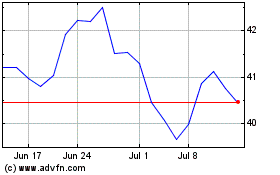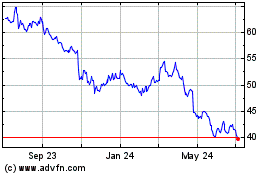Bristol-Myers Squibb Makes Moves to Reassure Investors
October 27 2016 - 1:26PM
Dow Jones News
By Jonathan D. Rockoff and Tess Stynes
Bristol-Myers Squibb Co. sought to convince investors Thursday
that its future was bright despite a major cancer drug setback by
unveiling an organizational revamp and $3 billion share buyback
while reporting better-than-expected quarterly results.
Shares in the New York-based drug company lost as much as a
third of their value after it announced in August that
immunotherapy Opdivo failed to meet the main goal of a critical
study exploring the drug's first-line use in advanced lung cancer
patients.
Investors and analysts feared the surprise setback would give a
competing drug from rival Merck & Co. a competitive advantage
in the multibillion-dollar immunotherapy market. That drug,
Keytruda, was approved Monday for use in first-line lung-cancer
patients.
In the third quarter, Opdivo sales rose to $920 million, up from
$305 million during the period a year earlier. That was less than
what many analysts had expected.
"The trends are good, and we feel optimistic about Opdivo in
both the short and long term," Bristol CEO Giovanni Caforio said in
a conference call.
Bristol shares rose more than 6% in morning trading on the New
York Stock Exchange after the company upped its financial outlook
for this year, offered a better-than-expected forecast for next
year and outlined its plans to stay atop the lung-cancer
immunotherapy market.
Bristol's share repurchases will come on top of $1.1 billion in
buybacks remaining under a previous program.
Mr. Caforio said the company's reorganization began earlier this
year and will streamline certain operations, such as its supply
chain for pills. Bristol didn't provide financial details, except
to say that excluding certain items, it expects operating expenses
through 2020 to remain at roughly this year's level.
Bristol pioneered cancer immunotherapy, which aims to fight
cancer by unshackling the body's immune system. Mr. Caforio said
Bristol still has bright prospects treating first-line lung cancer
patients by combining Opdivo with its other immunotherapy Yervoy,
which is under study.
"This will be a combination market," Mr. Caforio said.
Yervoy sales rose 19% to $285 million world-wide for the third
quarter. Revenue from another key Bristol product, the bloodthinner
Eliquis, jumped 90% to $884 million globally.
Overall, Bristol-Myers Squibb reported a profit of $1.2 billion,
or 72 cents a share, up from $706 million, or 42 cents a share, a
year earlier. Revenue increased 21%, to $4.92 billion.
For 2016, the company raised its per-share earnings estimate to
$2.80 to $2.90, from its previous estimate for per-share profit of
$2.55 to $2.65.
Looking ahead to 2017, Bristol-Myers gave preliminary guidance
for per-share earnings of $2.85 and $3.05, while analysts polled by
Thomson Reuters expected per-share profit of $2.19.
Write to Jonathan D. Rockoff at Jonathan.Rockoff@wsj.com and
Tess Stynes at tess.stynes@wsj.com
(END) Dow Jones Newswires
October 27, 2016 13:11 ET (17:11 GMT)
Copyright (c) 2016 Dow Jones & Company, Inc.
Bristol Myers Squibb (NYSE:BMY)
Historical Stock Chart
From Mar 2024 to Apr 2024

Bristol Myers Squibb (NYSE:BMY)
Historical Stock Chart
From Apr 2023 to Apr 2024
